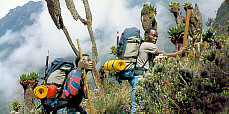 |
 |
Involucramiento de la Comunidad en el Turismo de Vida Silvestre:
Fortalezas, Debilidades y Retos
Caroline Ashley y Dilys Roe
International Institute for Environment and Development
Si desea ver el trabajo en una sola p´┐Żgina (>70Kb), pulse aqu´┐Ż
Cuarta Parte
- Introducci´┐Żn
- Ventajas del Involucramiento Local en Turismo
- Desventajas y Limitaciones del Turismo
- Mejorando el Involucramiento de la Comundidad
- Conclusi´┐Żn
- Referencias
Conclusi´┐Żn: Hacer que Funcione el Involucramiento Comunitario

Este trabajo ha explorado los beneficios que las comunidades pueden obtener a trav´┐Żs del turismo, y las desventajas del turismo convencional que necesita revisarse para mejorar el involucramiento comunitario. Ha resaltado algunos de los retos que necesitan enfrentarse - no para condenar el TIC como inapropiado (cualquier estrategia de desarrollo traer´┐Ż problemas de modernizaci´┐Żn a las comunidades rurales), sino para estimular m´┐Żs an´┐Żlisis sobre cuando o si es apropiado, y de m´┐Żs importancia, ´┐Żc´┐Żmo se puede enfrentar los retos? Por ejemplo:
´┐Żde qu´┐Ż manera podr´┐Ża desarrollarse el turismo para que m´┐Żs ingresos se queden localmente?
´┐Żqu´┐Ż medidas conducen a una distribuci´┐Żn m´┐Żs equitativa del ingreso entre los miembros de la comunidad?
´┐Żpuede el ingreso por el turismo ganarse colectivamente, no s´┐Żlo individualmente, y es esto importante?
´┐Żc´┐Żmo se puede fortalecer la gesti´┐Żn colectiva de los recursos naturales y culturales, para prevenir que la mayor´┐Ża pierda ante una minor´┐Ża dentro de la comunidad?
´┐Żqu´┐Ż lleva a la participaci´┐Żn activa y no solamente al involucramiento pasivo? ´┐Żen las comunidades y no solamente por unos pocos individuos?
´┐Żc´┐Żmo puede reducirse los costos ambientales de manera que complementen los beneficios sociales y econ´┐Żmicos?
´┐Żpuede hacerse que la etiqueta de ecoturismo tenga sentido para el TIC, o debe evitarse?
´┐Żc´┐Żmo pueden las comunidades desarrollar sociedades no explotadoras con el sector privado?
´┐Żcu´┐Żles son los roles apropiados de los diferentes interesados ´┐Ż residentes locales, ONGs, el sector privado, gobiernos, y donantes, en la soluci´┐Żn de estos y otros retos del TIC?
´┐Żqu´┐Ż tipo de intervenci´┐Żn gubernamental - en pol´┐Żticas o al nivel local - ayuda o entorpece el TIC?
´┐Żc´┐Żmo pueden reconocerse los objetivos de los diferentes interesados, el solapamiento aprovechado, y las diferencias reconciliadas?
La discusi´┐Żn ha resaltado apenas unas pocas estrategias que pudieran desarrollarse para hacer que el involucramiento de la comunidad en el turismo sea una herramienta efectiva para el desarrollo y la conservaci´┐Żn, y esperamos que los comentarios de los equipos de revisi´┐Żn suministren muchas m´┐Żs respuestas y maneras a seguir.
Referencias
Abbott, J. 1994. The Impact of Tourism on Cheruke Village, Lake Malawi National Park. Report to the Department of National Parks and Wildlife Management, Malawi.
Ashley, C. 1995. Tourism, Communities, and the Potential Impacts on Local Incomes and Conservation. Research Discussion Paper no. 10, Directorate of Environmental Affairs, Ministry of Environment and Tourism, Namibia.
Ashley, C. 1996. Community-Private Sector Negotiations for Tourism Joint Ventures: an Overview, workshop presentation, Directorate of Environmental Affairs, Ministry of Environment and Tourism, Namibia.
Ashley, C. 1997. Livelihood Strategies of Rural Households in Caprivi: Implications for Conservancies and Natural Resource Management. Living in a Finite Environment (LIFE) Programme of WWF and USAID, Windhoek, Namibia.
B´┐Żez, A.L. 1996. "Learning from Experience in the Monteverde Cloud Forest, Costa Rica" in People and Tourism in Fragile Environments, edited by M.F. Price, John Wiley and Sons, 1996.
Boonzaier, E. 1996a. "Local Responses to Conservation in the Richtersveld National park, South Africa" Biodiversity and Conservation vol 5, (3), pp307‑314
Boonzaier, E. 1996b. "Negotiating the Development of Tourism in the Richtersveld, South Africa" in People and Tourism in Fragile Environments, edited by M.F. Price, John Wiley and Sons, pp 123-137.
Brandon, K. 1993. Bellagio Conference on Ecotourism: Briefing Book. Rockefeller Foundation Conference, 8‑12 Febrero, 1993
Brown, K., R.K. Turner, H. Hameed, and I. Bateman. Tourism and Sustainability in Environmentally Fragile Areas: Case Studies from the Maldives and Nepal.
Drake, S. 1991. "Local Participation in Ecotourism Projects" in Whelan, T. (ed) Nature Tourism: Managing for the Environment, Island Press: Washington DC pp132‑163
Durbin, J.C. and Ratrimoarisaona, S‑N. 1996. "Can Tourism Make a Major Contribution to the Conservation of Protected Areas in Madagascar?" Biodiversity and Conservation, vol 5, (3), pp345 ‑ 354
Gakahu, C. 1992. "Participation of Local Communities in Ecotourism: Rights, Roles and Socio‑Economic Benefits" in Gakahu, C. and Goode, B. (eds) Ecotourism and Sustainable Development in Kenya, Wildlife Conservation International: Nairobi
Goodwin, H. et al. 1997. Tourism, Conservation and Sustainable Development; India Report, submitted to ODA, Abril 1997.
Hendrix, S. 1997. "Bolivia's Last Outpost of Hope" International Wildlife Jan/Feb 1997 pp 12‑19
Hasler, 1996. Ecotourism. A Comparative Analysis of Findings from Kenya, Zimbabwe, and South Africa. Centre for Applied Social Sciences, University of Zimbabwe. 50pp.
IIED. 1994. Whose Eden? An Overview of Community Approaches to Wildlife Management. A report by the International Institute for Environment and Development, submitted to ODA. 124pp.
International Resources Group 1992. Ecotourism: A Viable Alternative for Sustainable Management of Natural Resources in Africa, submitted to Agency for International Development, Washington DC. 98pp.
James, C. and Fournillier, 1993. Marine Turtle management in North‑East Trinidad: A Successful Community‑Based Approach Towards Endangered Species Conservation. Ministry of Agriculture, Land and Marine Resources.
Koch, 1994. Reality or Rhetoric: Ecotourism and Rural Reconstruction in South Africa, Discussion Paper DP54, United Nations Research Institute for Social Development, Geneva, Switzerland. 58pp.
McIvor, C. 1994. Management of Wildlife, Tourism and Local Communities in Zimbabwe, UNRISD Discussion Paper no 53 UNRISD: Geneva.
Murphree, M. 1996. "The Evolution of Zimbabwe's Community‑Based Wildlife Use and Management Programme" in Leader‑Williams, N.' Kayera, J. and Overton, G. (eds.) Community‑based Conservation in Tanzania. IUCN: Gland.
Ngobese, P. 1994. "What is it about ecotourism that is cause for concern?" GEM Monitor 1/94 pp 44‑49 GEM: Johannesburg.
Roe, D. and Leader‑Williams, N. 1997. The Environmental Effects of Wildlife Tourism, Wildlife and Development Series, No 10. IIED:London
Smith, C. and Jenner, P. 1992. The Tourism Industry and the Environment. Special Report no 2453, The Economist Intelligence Unit:London.
Wells, M. and Brandon, K. 1992. People and Parks: Linking Protected Area Management with Local Communities. World Bank: Washington DC.
WTO. 1993. Sustainable Tourism Development: Guide for Local Planners. World Tourism Organisation: Madrid.
Caroline Ashley y Dilys Roe
Abril 1997
| Turismo de Naturaleza | ´┐Żndice | P´┐Żgina inicial |